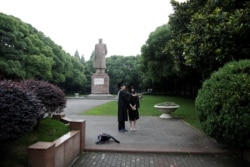Student Union
Hungary Welcomes EU’s First Chinese University Campus

Three years ago, the government of Hungarian Prime Minister Viktor Orban forced the well-regarded Central European University out of Budapest, largely because of who funded it — Hungarian-born American financier and philanthropist George Soros, long a target of populist conspiracy theories and a critic of Orban's championing of “illiberal democracy.”
Now the Hungarian government is pressing ahead with plans to host the first Chinese university campus in the European Union, underscoring Orban’s determination to continue to seek closer ties with Beijing, despite rising U.S. and Western anxiety about China’s deepening influence over parts of Central Europe.
An initial agreement was signed last month for Fudan University, based in Shanghai, to expand to the Hungarian capital, Budapest. Now Orban’s government has said it intends to help financially support the planned campus, which is scheduled to open in 2024, when it will greet around 6,000 students. The Fudan campus will offer degrees in economics and international relations as well medical and technical sciences, and Hungarian officials say they hope the campus will end up boosting Chinese investment in the country.
The welcoming of Fudan is part of a courtship by Orban of China and Russia, say analysts. Orban “looks to China and Russia as the alternative to the West,” according to Andras Simonyi, a former Hungarian ambassador to the United States and to NATO, citing the planned campus. “The incoming Biden administration, in its efforts to rebuild transatlantic relationships, should take note,” he said in a commentary in The Hill, a Washington-based newspaper, last week.
In November, Hungary renewed a cultural, scientific and educational treaty with China, which a spokesman for the Hungarian government said was in line with Budapest’s support for China’s Belt and Road Initiative, an ambitious trillion-dollar transcontinental trade and infrastructure project spanning Eurasia, Europe, the Middle East and parts of Africa.
The initiative has prompted the disquiet not only of the United States, but also of European Union leaders, who have voiced concern about Beijing's growing political clout in Europe and its use of commerce, investment and education as tools of statecraft.
The Hungarian government says the new campus will “enhance” the educational standards of Hungarian universities, teaching knowledge and skills vital for the development of Hungary’s economy. Hungarian officials raised no objections to Fudan University amending its charter recently, which saw a commitment to “freedom of thought” being replaced with a pledge to follow the leadership of the Chinese Communist Party.
Orban has cited Russia, Turkey and China as useful models for Hungary’s political development, and relations have warmed rapidly the past few years between Budapest, Beijing and Moscow. Eighteen months ago, the Hungarian government approved the relocation to Budapest of a Russian bank steeped in Cold War history headed by the son of a KGB (Soviet secret police) officer, who helped repress the 1956 Hungarian revolt against the Soviet Union.
U.S. and Western European officials have voiced increasing frustration with Orban’s pivot east and the burgeoning friendship with both China and Russian President Vladimir Putin.
Orban has opposed Western sanctions on Russia and in 2014 he bucked the West’s diplomatic isolation of the Russian leader in the wake of the Russian annexation of Crimea, welcoming Putin to Budapest and agreeing on a controversial $12 billion loan deal with the Kremlin to upgrade a Soviet-era nuclear power plant in Paks, 100 kilometers south of Budapest.
The contract was awarded without any counterbids and the details were classified until a court ordered the government to divulge them.
Since his reelection in 2010, critics have denounced Orban for what they see as a sustained erosion of democratic checks and balances. In 2019, Freedom House, a U.S.-based research organization, described Hungary as only “partly free,” the first time in history it has withheld from an EU member state the designation “free.” It accused Orban’s government of having “moved to institute policies that hamper the operations of opposition groups, journalists, universities and nongovernmental organizations (NGOs) whose perspectives it finds unfavorable.”
Nonetheless some analysts say that Orban’s political friendships with China and Russia aren’t based on any real ideological affinity, but more on the Hungarian leader’s assessment of the balance of power in Europe and his wanting to hedge his bets between the Eastern autocracies and Western democracies, playing them against each other in a bid to secure the best deals he can for Hungary.
Orban said on Friday that he was considering approving a Chinese COVID-19 vaccine for use in Hungary because the EU was not providing sufficient supplies of European-approved vaccines. “We’re unable to move faster with inoculating people not because Hungarian health care is incapable of carrying out mass vaccinations rapidly but because we have a shortage of vaccine supplies,” he said in an interview with public broadcaster Kossuth Radio.
He added: “The vaccination rate in the EU is below 1 percent due to the fact that there are not enough vaccines here.”
Orban’s tilt eastward has largely been overlooked by the Trump administration. The outgoing U.S. president saw Orban as a populist anti-immigrant ally. And Trump’s former adviser, Steve Bannon, described Orban as “Trump before Trump.”
But the incoming Biden administration is unlikely to be as friendly or view Orban’s warming ties with Beijing and Moscow with as much equanimity, say diplomats. In October while on the election campaign trail, Biden compared Orban’s Hungary and populist-led Poland to Belarus, saying NATO was at risk of “beginning to crack” because of an absence of American leadership. And last month at a research group event in Washington, Victoria Nuland, a Biden pick for a top job at the U.S. State Department, expressed her concern about European states backsliding on democracy.
Orban, who faces a likely tough election next year, was largely ostracized by the Obama administration for presiding over what Washington saw as an erosion of democratic checks and balances. Biden served as Barack Obama’s vice president. Orban also broke with diplomatic norms last year by publicly endorsing Trump in the White House race and making it clear he didn’t like working with Democrats, whom he dubbed “moral imperialists.”
He withheld congratulating Biden after the vote, only to do so belatedly in a letter, rather than with a phone call.
See all News Updates of the Day
- By VOA News
Competition grows for international students eyeing Yale

It’s tough to gain admission to Yale University, and it’s getting even tougher for international students as standout students from around the world set their sights on Yale.
The Yale Dale News, the campus newspaper, takes a look at the situation here.
- By VOA News
Student from Ethiopia says Whitman College culture made it easy to settle in

Ruth Chane, a computer science major from Ethiopia, writes about her experiences settling into student life at Whitman College in the U.S. state of Washington.
"The community at Whitman College made sure I felt welcomed even before I stepped foot on campus," she says.
- By VOA News
Claremont Colleges student gets a shock when she heads home to Shanghai

In The Student Life, the student newspaper for the Claremont Colleges, a consortium of five liberal art colleges and two graduate schools in Claremont, California, student Rochelle Lu writes about readjusting to her Shanghai home after spending a semester in the United States.
- By VOA News
Cedarville University aims to ease transition for international students

Cedarville University in the U.S. state of Ohio says it’s got more than 140 international students representing 44 countries.
Here, the school interviews Jonathan Sutton, director of international student services. He talks about his job and the opportunities for international students on campus.
- By VOA News
Morehouse College offers prospective students tips on applying and thriving

Morehouse College, a private, historically Black liberal arts college in the U.S. state of Georgia, offers a guide for international students interested in attending the school.
Among the tips to apply and thrive at Morehouse:
- Take advantage of the school’s orientation program
- Turn to the school’s Center for Academic Success for tutoring, support and more
- Immerse yourself in campus life via clubs and societies
- By Reuters
US reviews Columbia University contracts, grants over antisemitism allegations

The administration of President Donald Trump said on Monday it will review Columbia University's federal contracts and grants over allegations of antisemitism, which it says the educational institution has shown inaction in tackling.
Rights advocates note rising antisemitism, Islamophobia and anti-Arab bias since U.S. ally Israel's devastating military assault on Gaza began after Palestinian Hamas militants' deadly October 2023 attack.
The Justice Department said a month ago it formed a task force to fight antisemitism. The U.S. Departments of Health and Education and the General Services Administration jointly made the review announcement on Monday.
"The Federal Government's Task Force to Combat Anti-Semitism is considering Stop Work Orders for $51.4 million in contracts between Columbia University and the Federal Government," the joint statement said.
The agencies said no contracting actions had been taken yet.
"The task force will also conduct a comprehensive review of the more than $5 billion in federal grant commitments to Columbia University."
The agencies did not respond to requests for comment on whether there were similar reviews over allegations of Islamophobia and anti-Arab bias.
Columbia had no immediate comment. It previously said it made efforts to tackle antisemitism.
College protests
Trump has signed an executive order to combat antisemitism and pledged to deport non-citizen college students and others who took part in pro-Palestinian protests.
Columbia was at the center of college protests in which demonstrators demanded an end to U.S. support for Israel due to the humanitarian crisis caused by Israel's assault on Gaza. There were allegations of antisemitism and Islamophobia in protests and counter-protests.
During last summer's demonstrations around the country, classes were canceled, some university administrators resigned and student protesters were suspended and arrested.
While the intensity of protests has decreased in recent months, there were some demonstrations last week in New York after the expulsion of two students at Columbia University-affiliated Barnard College and after New York Governor Kathy Hochul ordered the removal of a Palestinian studies job listing at Hunter College.
A third student at Barnard College has since been expelled, this one related to the occupation of the Hamilton Hall building at Columbia last year.
Canada’s immigration overhaul signals global shift in student migration
From Europe to North America, nations are tightening their immigration policies. Now Canada, long seen as one of the world's most welcoming nations, has introduced sweeping changes affecting international students. The reforms highlight a growing global trend toward more restrictive immigration policies. Arzouma Kompaore reports from Calgary.
Trump administration opens antisemitism inquiries at 5 colleges, including Columbia and Berkeley

The Trump administration is opening new investigations into allegations of antisemitism at five U.S. universities including Columbia and the University of California, Berkeley, the Education Department announced Monday.
It's part of President Donald Trump's promise to take a tougher stance against campus antisemitism and deal out harsher penalties than the Biden administration, which settled a flurry of cases with universities in its final weeks. It comes the same day the Justice Department announced a new task force to root out antisemitism on college campuses.
In an order signed last week, Trump called for aggressive action to fight anti-Jewish bias on campuses, including the deportation of foreign students who have participated in pro-Palestinian protests.
Along with Columbia and Berkeley, the department is now investigating the University of Minnesota, Northwestern University and Portland State University. The cases were opened using the department's power to launch its own civil rights reviews, unlike the majority of investigations, which stem from complaints.
Messages seeking comment were left with all five universities.
A statement from the Education Department criticized colleges for tolerating antisemitism after Hamas' Oct. 7, 2023, attack on Israel and a wave of pro-Palestinian protests that followed. It also criticized the Biden administration for negotiating "toothless" resolutions that failed to hold schools accountable.
"Today, the Department is putting universities, colleges, and K-12 schools on notice: this administration will not tolerate continued institutional indifference to the wellbeing of Jewish students on American campuses," said Craig Trainor, the agency's acting assistant secretary for civil rights.
The department didn't provide details about the inquiries or how it decided which schools are being targeted. Presidents of Columbia and Northwestern were among those called to testify on Capitol Hill last year as Republicans sought accountability for allegations of antisemitism. The hearings contributed to the resignation of multiple university presidents, including Columbia's Minouche Shafik.
An October report from House Republicans accused Columbia of failing to punish pro-Palestinian students who took over a campus building, and it called Northwestern's negotiations with student protesters a "stunning capitulation."
House Republicans applauded the new investigations. Representative Tim Walberg, chair of the Education and Workforce Committee, said he was "glad that we finally have an administration who is taking action to protect Jewish students."
Trump's order also calls for a full review of antisemitism complaints filed with the Education Department since Oct. 7, 2023, including pending and resolved cases from the Biden administration. It encourages the Justice Department to take action to enforce civil rights laws.
Last week's order drew backlash from civil rights groups who said it violated First Amendment rights that protect political speech.
The new task force announced Monday includes the Justice and Education departments along with Health and Human Services.
"The Department takes seriously our responsibility to eradicate this hatred wherever it is found," said Leo Terrell, assistant attorney general for civil rights. "The Task Force to Combat Anti-Semitism is the first step in giving life to President Trump's renewed commitment to ending anti-Semitism in our schools."
- By VOA News
STEM, business top subjects for international students

The Times of India breaks down the most popular subjects for international students to study in the U.S.
STEM and business lead the pack. Read the full story here. (January 2025)
- By VOA News
Safety and visa difficulties among misconceptions about US colleges

U.S. News & World report addresses some of the misconceptions about U.S. colleges and universities, including the difficulty of getting a visa.
Read the full story here. (January 2025)
- By VOA News
Work opportunities help draw international students to US schools

US News & World Report details the three top factors in foreign students' decision to study in the U.S. They include research opportunities and the reputation of U.S. degrees. Read the full story here. (December 2024)
- By VOA News
British student talks about her culture shock in Ohio

A British student who did a year abroad at Bowling Green State University in Ohio talks about adjusting to life in America in a TikTok video, Newsweek magazine reports.
Among the biggest surprises? Portion sizes, jaywalking laws and dorm room beds.
Read the full story here. (December 2024)
- By VOA News
Harvard's Chan School tells international students what to expect

Harvard's T.H. Chan School of Public Health reaches out to international students by detailing the international student experience at the school.
Learn more about housing, life in Boston and more here.
- By Reuters
China unveils plan to build 'strong education nation' by 2035

China issued its first national action plan to build a "strong education nation" by 2035, which it said would help coordinate its education development, improve efficiencies in innovation and build a "strong country."
The plan, issued Sunday by the Communist Party's central committee and the State Council, aims to establish a "high quality education system" with accessibility and quality "among the best in the world."
The announcement was made after data on Friday showed China's population fell for a third consecutive year in 2024, with the number of deaths outpacing a slight increase in births, and experts cautioning that the downturn will worsen in the coming years.
High childcare and education costs have been a key factor for many young Chinese opting out of having children, at a time when many face uncertainty over their job prospects amid sluggish economic growth.
"By 2035, an education power will be built," the official Xinhua news agency said, adding that China would explore gradually expanding the scope of free education, increase "high-quality" undergraduate enrolment, expand postgraduate education, and raise the proportion of doctoral students.
The plan aims to promote "healthy growth and all-round development of students," making sure primary and secondary school students have at least two hours of physical activity daily, to effectively control the myopia, or nearsightedness, and obesity rates.
"Popularizing" mental health education and establishing a national student mental health monitoring and early warning system would also be implemented, it said.
It also aims to narrow the gap between urban and rural areas to improve the operating conditions of small-scale rural schools and improve the care system for children with disabilities and those belonging to agricultural migrant populations.
The plan also aims to steadily increase the supply of kindergarten places and the accessibility of preschool education.
- By VOA News
A look at financial aid options for international graduate students in US

The Open Notebook, a site focusing on educating journalists who cover science, has complied a list of U.S. graduate program financial aid information for international students.


